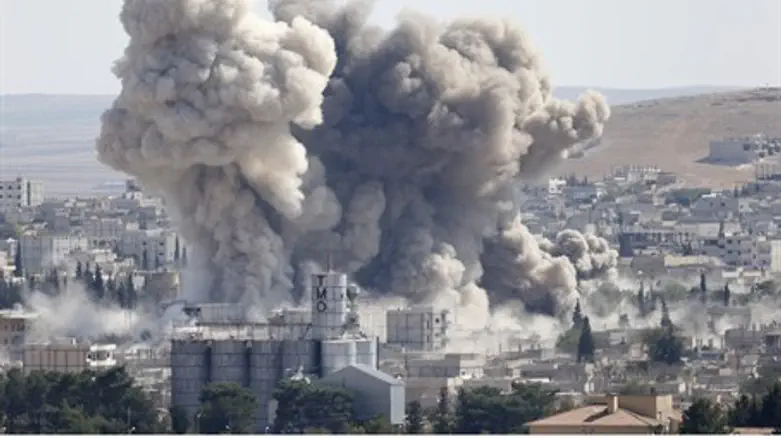
Once poised to overrun the Syrian town of Kobane, Islamic State (IS or ISIS) has suffered a damaging blow to its ambitions at the hands of Kurdish fighters and United States-led warplanes.
The setback in the mainly Kurdish town on the Syria-Turkey border has knocked the momentum out of the terrorists' advance and dashed their hopes of a swift expansion of their territory, analysts say.
In mid-September, ISIS began a seemingly relentless march towards Kobane, in a drive to consolidate its grip on a long stretch of the strategic northern border.
But Kurdish forces have recaptured most of the town in recent weeks, backed by a US-led air campaign in Syria that began on September 23.
Now ISIS holds just 20 percent of Kobane and faces the prospect of losing it entirely, according to the Britain-based Syrian Observatory for Human Rights.
Around 1,600 people have been killed in the fighting, at least 1,000 of them terrorists, but ISIS has continued to pour in reinforcements in a bid to win the high-profile battle for the town.
"Kobane has become a huge symbol. Everyone knows Kobane, it's where the Kurds stopped ISID," said Kurdish affairs analyst Mutlu Civiroglu.
"They (ISIS) lost hundreds of fighters, millions of dollars of weapons, and the image that wherever ISIS goes no one can stop them," he told AFP.
Huge US-led air support
The fighting in Kobane is just one of the fronts in Syria's complex civil war, which began with anti-government protests in March 2011 and evolved into a conflict that has killed more than 200,000 people.
On the ground in Kobane, it is militiamen of the Kurdish People's Protection Units (YPG) who have been battling ISIS, but analysts say the air support provided by the US-led coalition has been key to their successful defense of the town.
"Seventy-five percent of all US strikes in Syria were on Kobane. You give any force on the ground that kind of aerial support and they will get the upper hand," said Thomas Pierret, a Syria specialist at the University of Edinburgh.
Without the strikes, Pierret said, ISIS "would have taken over Kobane completely, because it has the means to bring more forces to the fight than the Kurds."
Mustefa Ebdi, a Kurdish activist from Kobane, said "ISIS did not expect such an intense aerial campaign", as evidenced by the discovery of "dozens of bodies of jihadists in liberated districts."
Civiroglu said the air strikes had prevented the Kurdish fighters being outgunned by the much better armed jihadists.
"They provided support that the YPG did not have, the mission of eliminating ISIS's heavy weaponry. The air strikes also limited IS's mobility, IS's movement and IS's capability of force," he said.
Kurdish forces have also benefited from fighting on familiar ground.
ISIS has had to fight without any network of local sympathisers and informers like those who helped the group to capture majority-Arab areas such as Raqqa in Syria and Mosul in Iraq, analysts say.
"Blow to ISIS expansion plans"
With the battle going their way, the Kurds "now have a clear policy of advancing bit by bit, street by street, to the east and the south," said Observatory director Rami Abdel Rahman.
But despite the battlefield reverses, ISIS has shown no signs of abandoning the fight.
The group has committed heavily to the battle for Kobane, which it refers to as Ain al-Islam, a play on the Arabic name for the town, Ain al-Arab.
On Friday, ISIS supporter Abu Abdullah al-Shami tweeted that the town was "one of the most important battles" for the terrorist group since it emerged in Syria.
And other supporters have taken to social media to denounce the "lies" that the Kurds now hold most of the town.
"What strikes me is their denial," said Pierret. "They don't recognize that they're being pushed back and they are continuing to act as though they're in control."
ISIS has been able to cling to territory elsewhere in Syria despite the coalition air strikes.
But with their hopes of a swift capture of Kobane dashed, further expansion has stalled.
"A part of their forces are stuck near Kobane," said Pierret, forcing the group to hold off on operations further west.
Kobane has proved "a blow to their dream of expansion," said Civiroglu. "Instead of being a great prize for them, it's turned around on them like a boomerang."